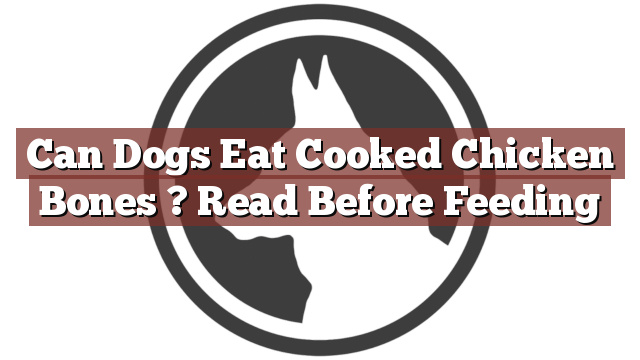Understanding Your Dog’s Dietary Needs
As a responsible pet owner, it is crucial to understand your dog’s dietary needs. Dogs are carnivorous animals, and their bodies are designed to consume and digest meat. However, not all types of meat are safe for dogs to consume. While cooked chicken is generally considered safe for dogs, can dogs eat cooked chicken bones? This question is important to address because bones can pose serious health risks to our furry friends.
Can Dogs Eat Cooked Chicken Bones? Read Before Feeding
The answer to the question on whether dogs can eat cooked chicken bones is a resounding no. Cooked chicken bones, as well as any cooked bones, can be hazardous for dogs. The cooking process makes bones brittle, causing them to splinter easily. When dogs chew on these bones, they can break into sharp shards that can puncture the dog’s digestive tract. This can lead to serious injuries such as internal bleeding, blockages, or even death.
If you want to give your dog chicken as a treat or part of their diet, ensure it is boneless and thoroughly cooked. Cooked chicken meat is a great source of lean protein for dogs and can be a healthy addition to their diet. However, it is crucial to remove all bones, including small chicken bones, before offering the meat to your four-legged companion.
Pros and Cons of Feeding Cooked Chicken Bones to Dogs
While it is clear that feeding cooked chicken bones to dogs is dangerous, it is essential to understand the pros and cons of this practice. Some dog owners may argue that giving their dogs cooked bones helps keep their teeth clean and satisfies their natural chewing instincts. However, the potential risks associated with feeding cooked chicken bones far outweigh these perceived benefits.
The cons of feeding cooked chicken bones to dogs are significant. As mentioned earlier, cooked bones can splinter easily, leading to various injuries and health complications. Additionally, the sharp bone fragments can cause choking hazards, especially for smaller dog breeds. The risks of feeding cooked bones to dogs are too high to justify the small potential benefits.
Conclusion: Weighing the Risks and Making Informed Decisions
In conclusion, it is crucial for dog owners to understand the potential dangers of feeding cooked chicken bones to their pets. While cooked chicken itself can be a nutritious addition to a dog’s diet, the bones should always be removed. The risks of splintering, choking, internal injuries, and other health complications are simply not worth taking. By making informed decisions about what we feed our dogs, we can ensure their safety and well-being.
Thank you for taking the time to read through our exploration of [page_title]. As every dog lover knows, our furry friends have unique dietary needs and responses, often varying from one canine to another. This is why it's paramount to approach any changes in their diet with caution and knowledge.
Before introducing any new treats or making alterations to your dog's diet based on our insights, it's crucial to consult with a veterinarian about [page_title]. Their expertise ensures that the choices you make are well-suited to your particular pet's health and well-being.
Even seemingly harmless foods can sometimes lead to allergic reactions or digestive issues, which is why monitoring your dog after introducing any new food item is essential.
The content provided here on [page_title] is crafted with care, thorough research, and a genuine love for dogs. Nevertheless, it serves as a general guideline and should not be considered a substitute for professional veterinary advice.
Always prioritize the expert insights of your veterinarian, and remember that the health and happiness of your furry companion come first.
May your journey with your pet continue to be filled with joy, love, and safe culinary adventures. Happy reading, and even happier snacking for your canine friend!

